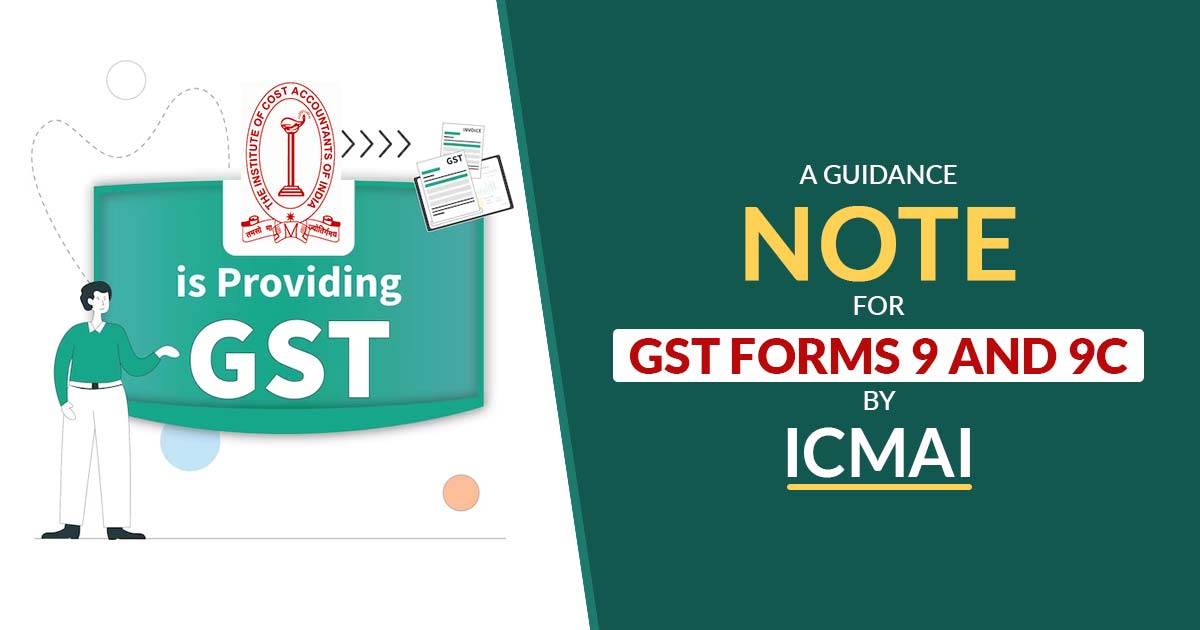
The Institute of Cost Accountants of India (ICMAI) has published a guidance note addressing the preparation and submission of Goods and Services Tax (GST) Form GSTR-9 and GSTR-9C.
This comprehensive note from ICMAI covers various essential aspects, encompassing legal provisions related to Annual Return, Records, and Accounts under GST Law. It provides a detailed walkthrough for filing GSTR-9 and GSTR-9C, incorporating relevant updates from press releases, notifications, and advisories.
Mark your calendars! GSTR 9 filing due date is December 31st of the subsequent year, ensuring compliance with the specific financial period
India’s implementation of the Goods and Services Tax (GST) aimed to transform the indirect tax system and establish a robust framework for tax compliance. The cornerstone of this system rests on two pivotal documents—GSTR-9 and GSTR-9C. These forms play a crucial role in GST compliance by ensuring precision, transparency, and adherence to GST law provisions.
The Annual Return (GSTR-9) acts as a consolidated summary, encapsulating a taxpayer’s GST transactions for the financial year. It serves as a comprehensive document, encompassing information on outward and inward supplies, input tax credits, and tax payments.
Read Also: ICAI: Technical Guide on GST Reconciliation Form GSTR 9C
GSTR-9 offers a comprehensive overview of annual transactions, facilitating the alignment of tax liabilities and payments while serving as an audit tool. Complementing this, GSTR-9C, the Reconciliation Statement, aims to harmonize GSTR-9 data with a taxpayer’s audited financial statements.
This rigorous process ensures that financial records comply with GST law requirements. The self-certification aspect of GSTR-9C adds credibility to GST compliance procedures, emphasizing the importance of accurate returns. Any discrepancies could prompt direct inquiries from the tax department, potentially resulting in penalties for non-compliance or incorrect submissions. These penalties can reach Rs. 200 per day, up to 0.25% of the total turnover.
“These self-certified returns carry significant weight, as any inaccuracies may prompt the tax department to raise inquiries and concerns directly with the taxpayer. Penalties for non-compliance or incorrect submissions for GSTR-9 can amount to Rs. 200 per day, capped at 0.25% of the total turnover. In this handbook, meticulously designed to demystify GSTR 9 & 9C, we aim to empower taxpayers and their compliance units with comprehensive insights” President of ICMAI, CMA Ashwin G. Dalwadi stated.
“We firmly believe this resource will not just enrich understanding but also cultivate better compliance methods. I offer sincere gratitude to the resource persons, contributors of knowledge, and critics whose combined dedication has elevated this handbook. Special commendations go to the Tax Research Department and the Western India Regional Council of the Institute for their unwavering commitment to creating this invaluable resource,” he added.
Read the official Guidance Note on GST Form GSTR 9 and 9C Click here






